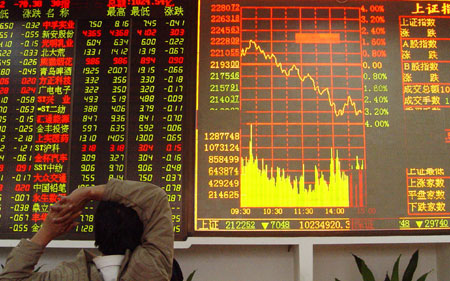 |
|
A shareholder sits and watches his stock's progress on an electronic board at a brokerage house in Haikou, Hainan province March 9, 2009, when Chinese stocks fell sharply again.
|
However, others argue market fluctuation should not delay development of the second board as it has the potential to become an important tool to satisfy small but fast-growing companies' thirst for capital.
"The second board could be a new financing channel for start-up companies, which find it almost impossible to acquire loans for banks," said Chen Yongzhen, a CPPCC National Committee member and chairman of Yongzheng Tailor Shop Group.
SMEs now account for half of the country's economic output and 75 percent of employment. But due to the lack of collateral and often incomplete accounting records, few banks are willing to lend.
Zhou Xiaochuan, governor of the People's Bank of China - the central bank, said loans made to SMEs last year increased just 13.5 percent, while the nation's overall loan growth was 18.75 percent.
SMEs are also particularly vulnerable to the uncertainty of the economic downturn. Thousands of export-reliant manufacturers have shut down in the last 12 months due to financial problems.
"SMEs are the most severely hit by the financial crisis and this year will be particularly difficult for them," added stock exchange director Chen.
It has already led to the government drafting policies to offer them further help and, at the opening session of parliament last Thursday, Premier Wen said in his 2009 work report that the support for SMEs will be 9.6 billion yuan ($1.4 billion), a sharp rise on the 3.9 billion yuan set aside in 2008.
Many bankers have also vowed to increase the number of loans to SMEs, with China Construction Bank expecting to repeat in 2009 the 20-percent rise it saw last year, according Xie Duyang, chairman of its board of supervisors.
Su Ning, deputy governor of the central bank, also said that although loans to SMEs accounted for 52 percent of those issued during 2008, and while the total amount of loans this year will exceed 5 trillion yuan, banks were still not meeting the demands of SMEs. Most commercial banks have instead favored government-supported projects, he said.
"Banks are unwilling to lend to SMEs due to the risks," said Yan Qingmin, Shanghai bureau director of the China Banking Regulatory Commission, with the average bad loan ratio as high as 12 percent in 2008. "In the long run, a multi-level capital market is the most effective way to provide capital to SMEs."
According to a 2001 report by international consultants McKinsey and Co, only 20 percent of SMEs in developed economies rely on bank loans for financing, compared with 90 percent in China.
"Support for SMEs should come from the whole financial system, instead of just bank loans and trusts," added Chen, who said loans can only solve short-term problems, while SMEs need solid support to survive and develop amid the financial crisis.
(China Daily March 10, 2009)